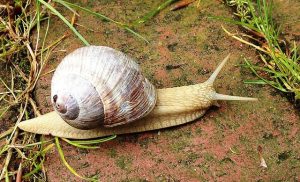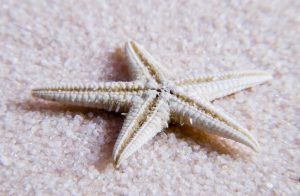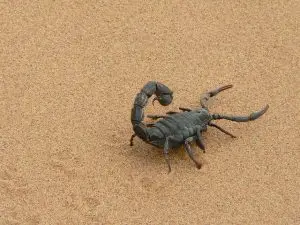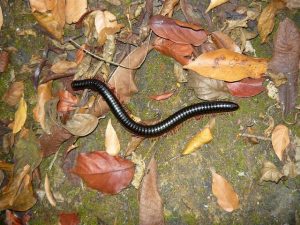Invertebrates are animals that do not have a backbone in the body.
The backbone is made of a vertebral column, a long bone present on the dorsal side of the animals.
It gives support to the entire animal’s body. This vertebral column houses the spinal cord, which is one of the essential organs of the body.
Examples of Invertebrates
- Sponges
- Insects
- Molluscs
- Echinoderms
- Arthropods
- Annelids
- Flat and roundworms
- Ctenophore (comb jellies)
- Cnidarians
- nematodes
Sponges
These species of animals are the first in the series of invertebrates as per evolution.

They are multicellular invertebrate animals with porous bodies.
They lack organs and rely on water flow for most activities like respiration and excretion.
The adults are nonmotile, while younger ones move with amoebic movements.
Insects
These are significant examples of Invertebrates forming the largest class in the group.
They are six-legged animals with the ability to fly.
They do not have a vertebral column or a spinal cord. But instead, they possess an exoskeleton made of the cuticle.
Examples of insects include
a) Butterfly

b) Housefly

c) Mosquitoes
d) Cockroach
e) Lice
f) Termites (like those on dogs).
Molluscans
- These are the animals that have flexible, soft, and stout bodies.
- They are of different shapes and lack a vertebral column.
- Perhaps the presence of vertebral columns in these animals would not permit the flexible nature of the body.
- Most of them are marine, while few of them live in freshwater and on land.
Mollusk examples include

a) Snails
b) Oyster.
c) Octopus
d) Slugs
f) Squid are examples of marine invertebrates.
Echinoderms
- These marine animals have radial symmetry.

a) Starfish
b) Sea cucumber
c) Sea Urchin.
Arthropods
- These animals have jointed appendages as legs.
- They also include insects, but those without the ability to fly will be discussed here.
Examples include:
a) Scorpion

b) Crabs
c) Spiders
d) Crayfish
e) centipedes

Annelids
- These animals creep and crawl on the ground.
- Their body is cylindrical in shape with many ring-like annules on the surface.
- These annules are present on the entire body and provide a grip for movement.
- They do not have legs and also a vertebral column.
Examples of annelids are
a) Earthworms

b) Leeches
c) Rag-worms.
Flatworms/Tapeworms

- These are delicate thread-like living organisms.
- They are present as parasites in humans and other mammalian digestive tracts.
- They do not have limbs and vertebral columns.
Examples of Platyhelminthes invertebrates
- Taenia solium
- Taenia saginata
Cnidarians
These animals are found in water and have cnidocytes that help to capture the prey.
They have a jelly-like substance on their body and lack a vertebral column.
Jellyfish is an example.
Ctenophore (comb jellies)
- These animals are marine living and have jelly-like substances on their body.
- They swim with the help of cilia and lack vertebral columns.
Nematodes

- These are small worms and are even called roundworms.
- They are invertebrates and have wide distribution on the earth.
Examples of nematodes are
- Ascaris
- Hookworm
- Trichuris trichiura
- C. elegans
From the list mentioned above, we can answer a few questions like
1. Examples of parasitic invertebrates: These include helminth parasites, ectoparasites (leeches), lice, etc.
2. Examples of mollusks invertebrates: Corals, Starfish, octopuses, etc.
Frequently asked questions and answers.
-
Is a frog vertebrate or an invertebrate?
The frog is a vertebrate animal.
-
Is a butterfly vertebrate or invertebrate?
A butterfly is an insect and an invertebrate
-
Is a lionfish vertebrate or invertebrate
Lionfish is a vertebrate animal
References
That is a wonderful research.
yep helped me on i test
Thanks a lot.
You have not inserted jellyfish, so I assume it is not an invertebrate, but when I searched the web for it, it showed me that a jellyfish is an invertebrate, so now I am feeling really cross with you.?
THANK YOUU